Institute Leadership
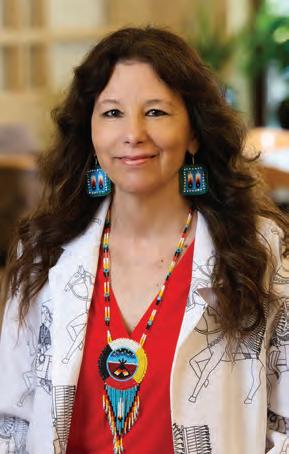
Angelique W. EagleWoman (Sisseton Wahpeton Oyate) Director
Angelique W. EagleWoman (Wambdi A. Was’teWinyan) began her career in legal academia in 2006 as a law professor at Hamline University School of Law, a predecessor school to Mitchell Hamline. As conditions did not allow for the establishment of a program focused on Native American law, she started on a full circle journey that brought her back to Mitchell Hamline in 2018. In the fall of 2021, Professor EagleWoman realized the dream of stewarding the Native American Law and Sovereignty (NALS) Institute in the Dakota homelands by becoming director. During her legal academic journey, EagleWoman established the Native American Law emphasis program at the University of Idaho College of Law in 2008, and in 2016 she became the first Indigenous law dean in Canada when she assumed the deanship of the Bora Laskin Faculty of Law at Lakehead University in Thunder Bay, Ontario. She has taught several times in the Pre-Law Summer Institute for American Indians and Alaska Natives, as she is dedicated to increasing the number of Native American attorneys in the country. She has received numerous awards for her teaching, scholarship, and contributions to supporting diversity in higher education.
In October 2022, she was sworn in as the Chief Justice of the Sisseton Wahpeton Supreme Court, after previously serving as an associate justice since November 2020. She is the only member of the Sisseton Wahpeton Oyate (Dakota) of the Lake Traverse Reservation to sit on this court. As a Dakota woman, having the opportunity to teach the law on Dakota homelands in St. Paul is especially meaningful to her. EagleWoman is a nationally known expert in the field of Native American law. She presents and publishes on topics including Tribal-based economics, Indigenous sovereignty, international Indigenous legal principles, treaty rights, Tribal court jurisprudence, and the evolving relations between Tribal Nations and the United States. She is the author of the casebook, NATIVE AMERICAN LAW: TRIBAL NATIONS AND THE UNITED STATES RELATIONS CASES AND MATERIALS (1st ed. 2025). She is co-author of the book MASTERING NATIVE AMERICAN LAW (3rd ed. 2024)) with Stacy Leeds (Cherokee Nation), dean and professor at the Sandra Day O’Connor College of Law, Arizona State University and the first Native American woman dean in the United States (University of Arkansas Law). EagleWoman attended Stanford University, B.A. in Political Science; University of North Dakota School of Law, J.D. with distinction; and the University of Tulsa College of Law, LL.M. in American Indian and Indigenous Law with honors. She is a citizen of the Sisseton Wahpeton Oyate (Dakota) of the Lake Traverse Reservation and from the Thunderbeings Clan.
Two of Professor EagleWoman’s recent publications include:
♦ NATIVE AMERICAN LAW: TRIBAL NATIONS AND THE UNITED STATES RELATIONS CASES AND MATERIALS (1st ed. 2025)
♦ MASTERING NATIVE AMERICAN LAW (3rd ed. 2024) co-authored with Dean and Professor Stacy Leeds
2022 Graduates


2023 Graduates

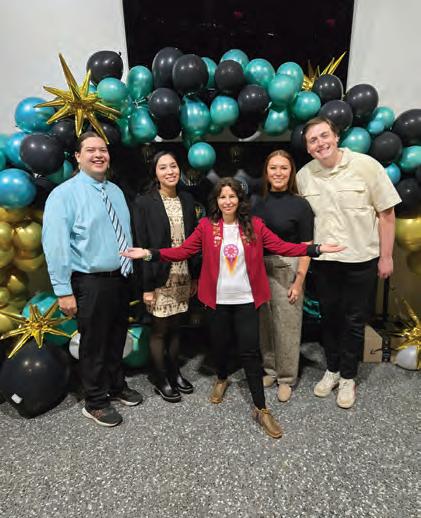
2024 Graduates
2025 Graduates
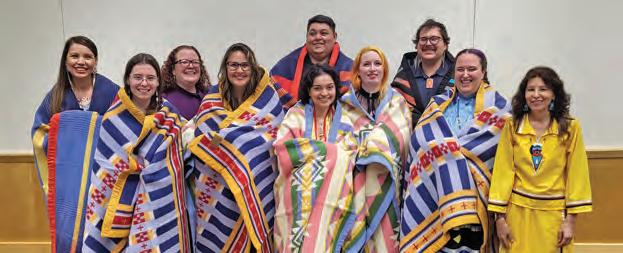

Native American Law and Sovereignty Institute
Contact information: NALS Program office: 651–695–7723 NALS.Institute@mitchellhamline.edu
Director, Angelique EagleWoman Office: 651-290-6438


875 Summit Avenue St. Paul, Minnesota 55105
888-962-5529 mitchellhamline.edu
Follow the institute on Instagram: @nals_institute Recruitment sessions: mitchellhamline.edu/nativelaw
mitchellhamline.edu/native-american-law-and-sovereignty
Empowering legal perspectives and skills, in a supportive community that prepares students to take on the legal challenges and issues in Indian Country
Academics
The Native American Law and Sovereignty (NALS) Institute is unique as a program at the law school. It has dual purposes of furthering legal education in the field of Native American law and of recruiting, supporting, retaining, and graduating Native American law students. Further, it maintains a strong connection to the Indigenous peoples of this region and the sovereign Tribal Nations in Minnesota. The institute is also engaged in highlighting and supporting the cultural and traditional Indigenous legal principles the Native faculty and students bring to the school. NALS Institute tutors are available to assist students with legal skill development and bar exam preparation.
The institute is grounded in the practical skills of lawyering. Students learn from professors who have spent their careers working in Indian Country for Tribal Nations, law firms, and other entities involved with Tribal governments.
Certificate and Courses
The institute offers a certificate program for law students who complete four requirements. The flow of courses begins with an overview course introducing students to the Tribal Nations–U.S. relationship, including a focus on the Tribal perspective on interactions through treaties and other legal agreements, U.S. policy eras related to Indian affairs, U.S. Supreme Court cases, and federal legislation impacting Tribal governments, the Tribal land base, and Tribal citizens. The prerequisite course, Native American Law, provides an opportunity to review historical policies, cross-cultural perspectives on legal developments, and their continuing legacies to contextualize contemporary court decisions and the evolving governmental relations. The course is regularly offered in both the fall and spring semesters, to allow in-person and blended-learning students opportunities to take it. Next, students complete the foundational course requirement by taking Advanced Topics in Native American Law and the paper course, Introduction to Tribal Law. From this starting point, students may shape their trajectory through advanced course options to deepen their understanding and legal skills to enter the legal profession. All of the regularly offered courses are available in an online format.
The remaining three requirements are to complete experiential learning credits, write a legal research paper on a Native American law topic, and take electives within the student’s area of concentration as discussed with the faculty advisor.

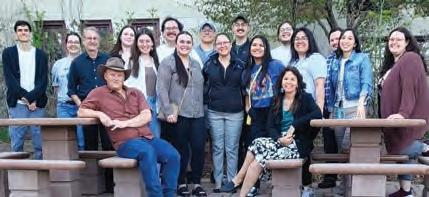
Clinics and Externships
The institute provides opportunities to engage in the work of lawyering as a law student. The Native Law: Tribal Code Drafting Clinic is supervised by Professor EagleWoman, former in-house counsel for the Sisseton Wahpeton Oyate (Dakota) of the Lake Traverse Reservation and transactional expert for Tribal law, regulation, and policy drafting. Students in the clinic are introduced to a small-firm environment where the faculty member serves in a senior partner role. Students receive drafting assignments that have been approved as legal development projects at the request of Tribal governments and organizations.
The institute partners with Tribal court judges to offer judicial externship opportunities for law students in the upper years. In addition to judicial externships, law students may participate in an independent externship with lawyers practicing in a variety of capacities within Indian Country or other Tribal legal areas.
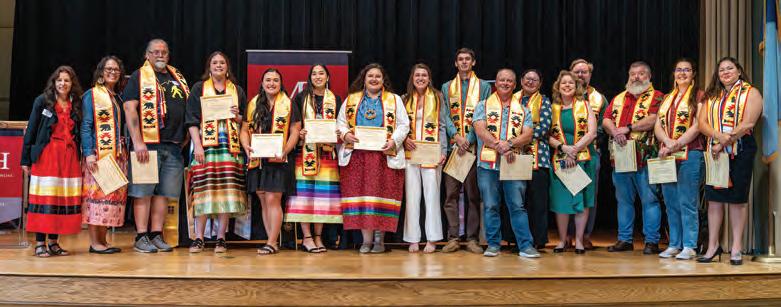
Community
Mitchell Hamline School of Law has the largest number of Tribal Nation members and Indigenous law students.
As part of the institute, students join a community of law students and alumni across the country sharing similar experiences as Native Americans entering the field of law or as students interested in the field. Law students have the opportunity to join the Mitchell Hamline Native American Law Student Association (NALSA) chapter. Our NALSA chapter participates in advocacy at the local, regional, and national levels. Participants in coursework and NALSA may apply to represent the law school in the annual National NALSA Moot Court Competition. Guest speakers are invited by Mitchell Hamline NALSA to celebrate and elevate Indigenous Peoples’ Day and other events.
The Indigenous Women’s Law Society (IWLS) is another community organization that welcomes law students. The goals of the organization are to uplift each member, celebrate Indigenous legal traditions, advocate for justice, and build a strong, connected community through mentorship, cultural awareness, and advocacy. By inviting empowering speakers and hosting creativity sessions, the IWLS adds another opportunity for community within the NALS Institute.
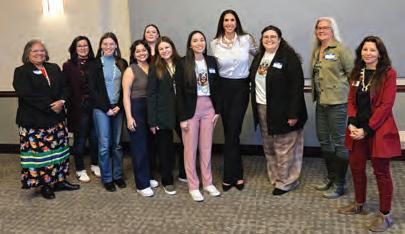
Alumni and Networks

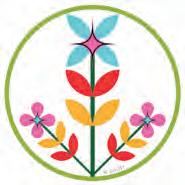

Mitchell Hamline has a large alumni network to support and encourage current law students. The NALS Institute Advisory Board is composed of seven alumni leaders in the legal profession who support events and initiatives. The NALS Institute collaborates with the Minnesota Native American Bar Association (MNABA) board of directors, and NALSA students serve on a range of committees. The institute is connected with a network of regional and national Native-focused organizations and activities. Law students may be mentored by practicing lawyers and judges throughout Indian Country and in this field of law.


